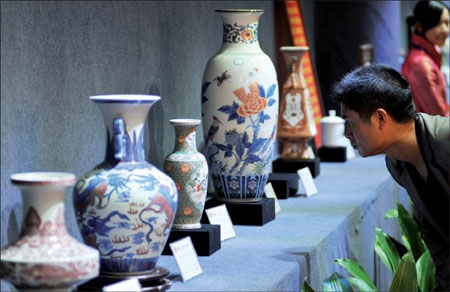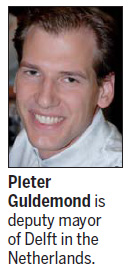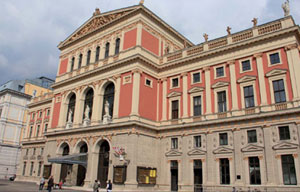This is home of China
Updated: 2011-10-28 09:29
By Wang Chao (China Daily)
|
|||||||||
Jingdezhen finds itself in the throes of change as porcelain makers seek out new markets
For more than 1,700 years Jingdezhen, a city in East China's Jiangxi province, has been home to some of the best and most valuable handmade porcelain in the world. But in a sign of the times and the fast-changing global landscape, the one-time porcelain capital is struggling to maintain its rich tradition of fine handmade china, even as companies are struggling to keep pace with rapid industrial modernization. Jingdezhen is a town that lives and breathes porcelain, but its priceless ceramic products have not been able to make much headway in the fiercely crowded international marketplace for high-end products dominated by US and European companies.
Evidence of the waning trend was visible when a factory from the Guangxi Zhuang autonomous region bagged the coveted order for supply of tableware at Prince William's marriage earlier this year. For hundreds of years, Jingdezhen had always been the first-choice for Chinese royal porcelain ware.
Even today the blue and white porcelain produced in Jingdezhen during the Yuan Dynasty (1271-1368) is among the most sought after items by connoisseurs at international auctions.
|
||||
Most of the current efforts are focused on promoting the Jingdezhen brand name in global markets. Since 2004, the city government has been holding an annual international ceramic fair to showcase its products.
The fair is extremely popular and not only helped increase product awareness, but also attracts leading global ceramic majors such as Delft of the Netherlands and Limoges of France to Jingdezhen.
|
 The annual Jingdezhen International Ceramic Fair was held from Oct 18-22 to promote the Jingdezhen brand. [Shi Weiming / for China Daily]
|
"Three hundred years ago, when Chinese porcelain first came to the Netherlands, we liked it a lot, and started to copy from them. With such a rich experience and the support of the Ceramic Institute, I'm positive that Jingdezhen will regain its glory days in the high-end market."
Guldemond says that the city government is already doing a great job by promoting ceramic products at international fairs and conferences. "The government needs to continue doing this with more efforts."
Giuseppe Olmeti, director of the Italian Association of Cities of Ceramics, feels that Jingdezhen needs more brand promotion and exposure in the international markets for its products to be well known.
"There are various competitions for international ceramic artists in Italy. Though we see frequent participation from Japan and South Korea, there is hardly any Chinese participation. It is difficult to boost brand consciousness unless you have regular exposure," Olmeti says.
Olmeti, however, feels that Jingdezhen should retain its handmade ceramic ware advantage even as it climbs up the value ladder.
"There are two spectrums of ceramic styles around the world, the very traditional and the very modern one. China should keep the traditional elements, which are the essential strength of the Chinese porcelain, and blend some modern techniques into it."
Like other businesses, ceramics makers are also realizing that diversification is the best way for better returns. So even as the clamor for retaining the old practices gathers momentum, there are several others who are ready to embrace change.
Taiwan businessman Franz Chen, the president of Franz Collection Inc in Jingdezhen, feels that diversification is the best way forward.
Established in Jingdezhen in 2004, Franz currently sells porcelain products to 56 countries and regions through its 6,000 global stores. Until 2009, most of the company's products were sold to customers in Europe and the United States.
But after the financial crisis, the company reduced its dependence on overseas markets and currently only 45 percent of its products are exported. In the domestic market the company has focused largely on boosting sales in cities such as Beijing and Shanghai. Most of the company's products are highly priced with a small coffee cup costing over 2,000 yuan ($314, 226 euros). Last year mainland sales accounted for revenue of nearly 120 million yuan.














